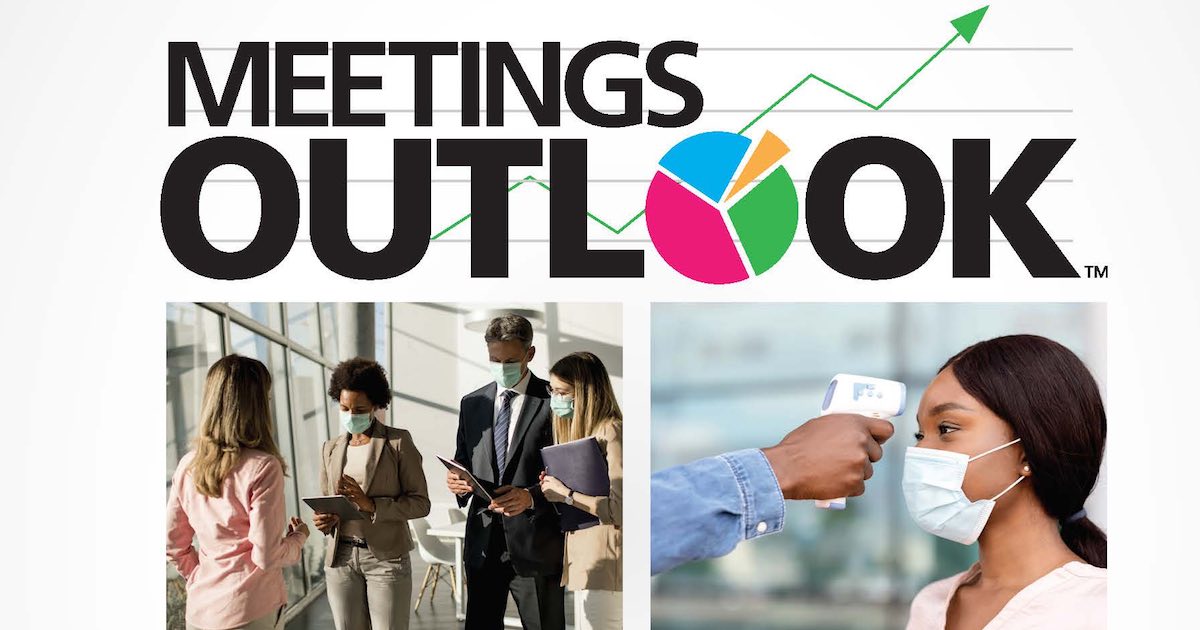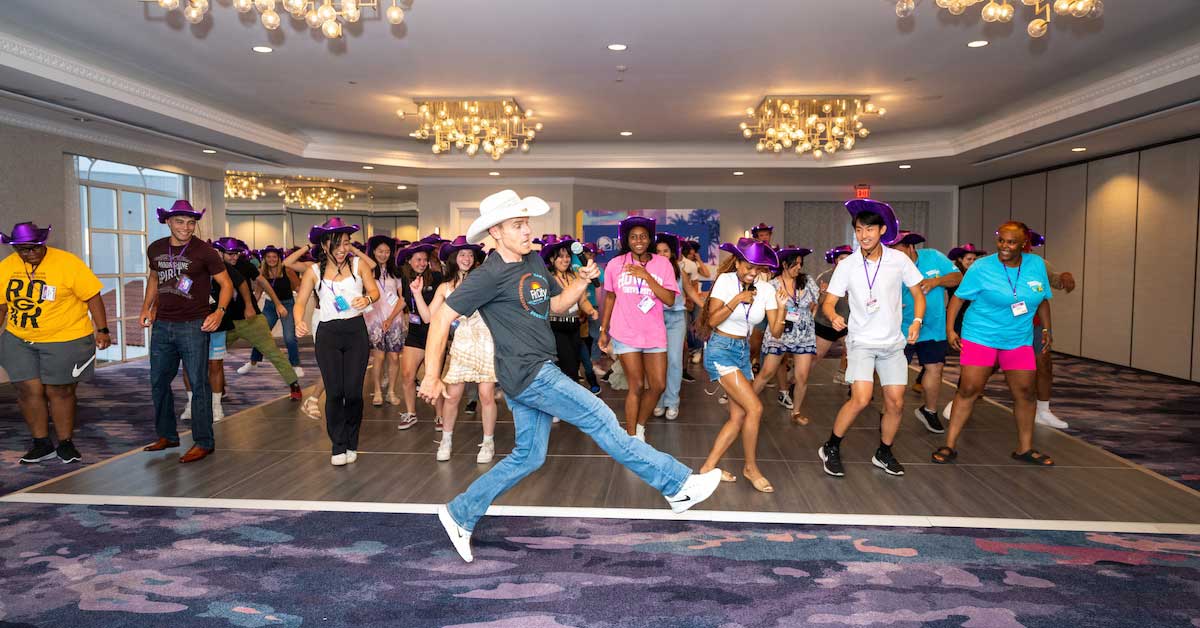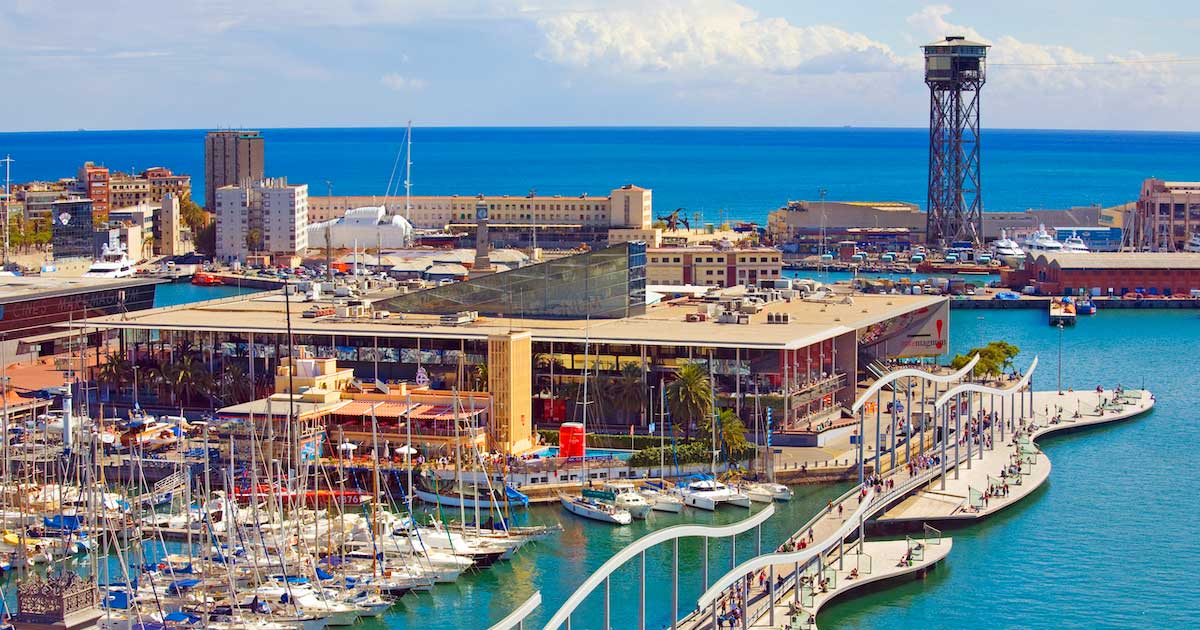Days after sharing her recent experience and insights for this report, Melissa Holland, CMP (MPI Dallas/Fort Worth Chapter), event manager for Keystone Automotive Operations, Inc., traveled to Orlando for her organization’s first face-to-face event since the start of the pandemic.
“It’s a little hectic right now,” she said as she was simultaneously about to execute that momentous gathering while also planning a virtual event for two weeks later, an upcoming in-person March event for which last year’s edition was cancelled and yet another virtual event after that. “My team and I have our hands full, but I know we’re making a comeback in 2021, slowly but surely.”
The winter 2021 Meetings Outlook survey finds continued slight increases in all positive indicators for face-to-face meetings and events. While this remains a far cry from the pre-pandemic business events landscape, for the second consecutive quarter, survey data is pointing to an improvement across hiring as well as projections for business conditions, budgets and live attendance. Overall, 65 percent of respondents predict favorable business conditions for the year ahead—over the summer, only 36 percent of respondents said the same.
For the first time, the survey also asked an existential question, gauging to what extent meeting professionals are concerned that their organization or business won’t survive 2021. Overall, most respondents (63 percent) are not concerned about such a collapse, but there is a slight split between this concern from planners and suppliers. Twenty percent of suppliers are indeed afraid their organization won’t survive the year; 13 percent of planners said the same.
Vaccines and Hope
To what extent are these positive projections based on the initial rollout of approved COVID-19 vaccines? Well, 53 percent of respondents said that plans for holding their next in-person event are contingent on the distribution of a safe and effective vaccine. With 31 percent of respondents saying their next in-person event may depend on a vaccine, only 16 percent of respondents said their next such event is not contingent on a vaccine. Clearly, once vaccines become more widespread, event professionals expect an increase in activity.

However, with most of the approved COVID-19 vaccines requiring multiple doses and the inherent delay in getting vaccines to billions of people, the turnaround won’t be immediate.
“We are remaining hopeful of the positive impact that vaccine distribution will have on the meeting industry, by building confidence in the ability to safely host meetings in person,” says Brad Dean (MPI South Florida Chapter), CEO of Discover Puerto Rico. “In fact, our Discover Puerto Rico sales team has seen an increase in leads just in the last few weeks, compared to spring and summer months during the pandemic, correlating to the first phase of distribution of the vaccine.”
Therein exist some concerns. While widespread distribution of COVID-19 vaccines is the most promising step and hope in the global battle against the virus, there are unknowns—from mutations that may render the vaccine ineffective or less effective to potential side effects as we’ve never before with mRNA vaccines.
“If there are issues with the vaccine, we will all slow,” says Steven Kinsley (MPI Rocky Mountain Chapter), president of Kinsley Meetings. “But we feel, based on the science that we have read, that the vaccine will be effective, and our clients are planning on moving forward with in-person programs. As we all know, things change almost daily, so we are constantly keeping up to date on the vaccine and virus situations.”
Kinsley explains the path on which his company is moving to execute safe live events going forward—what he calls “Work Readiness.” This is essentially a focus on being aware of the landscape and the changes necessary to proceed.
“From health and safety protocols for your location to airline requirements to what the hotel/resort/venue is doing to make sure guests are safe on a continuous basis,” he says, the list of elements on which to focus for such readiness is long.
A Coming Surge?
A survey respondent who wished to remain anonymous said that while clients are hesitant to plan future in-person events right now, space could quickly become limited if many people open their arms to travel again at the same time. However, by and large, industry professionals do not expect a surge of business once vaccinations become widespread, rather a gradual increase is anticipated and certainly affected by the market segments involved.
Looking deeper into the 53 percent of respondents who said their next in-person event is contingent on the distribution of a safe and effective vaccine, 41 percent expect their return to live events will happen between three and six months after vaccinations began—so mid-2021. Thirty-six percent, however, believe it’ll take between six and 12 months after vaccinations began before they’ll host face-to-face gatherings again.
So, when is full recovery expected? The vast majority of respondents (86 percent) expect business will return to pre-pandemic levels in 2022 or later. The most common answer was “2022,” as reported by 49 percent of planners and 42 percent of suppliers.
“We all want to be optimistic, right? I do feel successful, widespread vaccinations will improve attendance at events—and this will grow over time,” Holland says. “It’ll take some time before we get back to 100 percent, but when we have our events in 2022, I imagine we’ll see—pending no further situations pop up—an increase in attendance.”
Indeed, with a global population in excess of 7.8 billion, distribution of vaccines will be neither quick nor simple. But there are other concerns involved, such as the psychological impact the pandemic has had on people’s perceptions of travel and being around large groups.
In her Meetings Outlook survey response, Molly Marsh (MPI Kentucky Bluegrass Chapter), director of education and engagement design at AMR Management Services, warned of “the challenges of returning to travel—not just in safely managing business travel but also overcoming the changes in culture and perception of travel based on the pandemic. We really do not know what the appetite will be for association events even when a vaccine is readily available—we don’t know what the longer-term economic issues might be which prevent association members from being able to travel to events even when things become normalized. That continued uncertainty remains the biggest issue.”
This concern is shared on the supplier side as well.
“As sentiment surrounding in-person meetings and travel continues to improve, we do expect growth in bookings,” Dean says. “However, given the challenges presented with COVID-19, we know very well that it will take time get back to the volume of business we saw pre-pandemic. We understand that not everyone will be comfortable traveling immediately; hence, we don’t expect to see an immediate change overnight.”
Dean notes that some segments are expected to rebound more quickly. Discover Puerto Rico’s leads by market segment for the past six months, he says, show that the religious, health and medical, finance and agriculture markets will likely be the first to come back.
“I’ve read articles, and heard people speak, on this expected surge or ‘revenge tourism’ and I am not sure I agree completely,” says Barry Schieferstein (MPI Ohio Chapter), director of conferences and meetings with the American Society for Nondestructive Testing. “Yes, there is a pent-up demand for in-person events, but I think it is only a segment of our attendees. A certain percentage won’t ever return to events because they can get what they need—the content—in other ways. Another, larger percentage, of people won’t feel comfortable travelling for quite some time. Rather than a surge of business, I, like many others, think that we will see an increased number of smaller, regional events before we get back to what we had. To that end, I am looking at how I can I make my events cater to all of these customers through hybrid offerings and the hub-and-spoke model of taking a large event and bringing it down to the regional level.”
Whether or not there’s a surge in meeting and event business, industry pros say they’ll be ready.
Holland is focusing on safety, communication and education to ensure stakeholders are comfortable with events, either live or virtual—and she expects such outreach may be needed even as face-to-face business picks up.
“We did a lot of research into how we’d be able to come back in 2021 with an in-person event,” she says. This included a lot of new training; research into the myriad regulations, procedures and protocols; and benchmarking. “We’ve just been trying to absorb as much intel as possible in order to make sure we’re successful at the next live event.
“We’re doing everything we can—social distancing, wearing a mask and washing hands/using sanitizer, with reminders everywhere, a lot of communicating with our exhibitors, staff and customers around our efforts—to make sure that we kick off a safe event and as we get through these programs, we’ll have some lessons learned and take our 2022 programs onto the next level. I’m truly thankful for the team I work with who make it happen each and every day.”
The challenge isn’t just being able to welcome back business events. Schieferstein anticipates several long-lasting—maybe permanent—changes related to attendees, exhibitors and venues.
“Even as many of us were quick to make the shift to virtual, there are still organizations in transition,” he says. “In-person events will need to be more experiential in order to offset the reduced significance of the content [that may be available virtually]. We will need to be more intentional in our efforts to make the attendee experience worth the expense of travelling to a meeting or conference.”
While the acute effect of the above could be temporary, Schieferstein sees potentially permanent changes to the exhibitor landscape.
“As the pandemic drags on, more and more marketing dollars are being shifted to other areas as exhibitors find other methods to generate leads and sales. Some exhibitors are going to be reluctant to return to a trade show floor at their pre-COVID capacity,” he says, noting that many sectors were already experiencing a decline in trade show participation before the pandemic—and COVID will hasten that decline.
“The final area where I have a level of concern: the consequences of ‘brain drain’ because of the mass layoffs of tenured people at hotels and convention centers,” he says. “By the time we return to in-person events, the event planner with years of experience who was intimately familiar with the property may have been replaced with someone who has been in the position for a few weeks. This loss of experience is going to cause planners to be much more detail oriented in their planning calls and site visits.”
As a result of these issues and more, Schieferstein thinks that relational contracting will become much more important.
“Both sides need to understand the needs and requirements that the other side has. By looking at a destination as a partner in the success of your event, instead of an adversary that we try to squeeze concessions out of, we can all come out of this in a stronger position to succeed,” he says.
Seventy-six percent of survey respondents report the business landscape as a buyer’s market—the greatest we’ve seen. Of course, that’s not as clear cut as it may seem at first blush: What good is a business market advantage when there are few or no face-to-face events to plan?
Still, this leads to an important lesson that industry pros must remember: If the planner-supplier landscape is favoring your side at the moment, don’t use it to take advantage of your colleagues on the other side. Markets will flip again, and when those colleagues are on top, you’ll wish you had solid relationships based on mutual respect in times good and bad.
Regardless of how events take place moving forward, one thing is for certain, as elucidated by Kinsley: “We are not meeting planners; we are meeting architects. We create context, no matter the platform, so that our clients can share their content.”
Meetings Outlook is supported in partnership with IMEX Group.


.jpg?sfvrsn=96553155_1)




